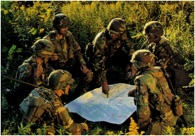Tactics 101:028 – Commander’s Guidance
What form should it take?
As in anything there is nothing like receiving direction in person – straight from the commander! Thus, most commanders will give their guidance verbally. To do this, commanders may utilize a simple fill-in the blank checklist (which he constructs during visualization and the mission analysis brief) to talk from. The commander need not be a great orator to deliver an effective guidance. He simply must be clear, direct, and understood by his staff. One technique to ensure the staff understands his guidance is for staff to quickly back brief the commander on what he said following the guidance. Obviously, this takes time and time is precious, but ensuring the staff understands the guidance is as they say – PRICELESS!
Another technique the commander may utilize (not as effective) is to issue a written guidance to his staff. Perhaps, for various reasons the commander can not or does not like to issue verbal guidance. If that is the case, a written guidance to the staff is truly better than no guidance at all.
{default}Of course, the best of both worlds is for the commander to issue a verbal guidance and additionally formulate a written guidance stressing his key points. This does place some time demands on the commander and many commanders do not want to craft a written guidance. Again, this is personality dependent.
To whom is it given?
The main audience for commander’s guidance is of course the unit’s principal staff officers and planners. If at all possible, a unit should try to have subordinate commanders (in a brigade those would the battalion commanders and combat support/combat service support commanders) attend the mission analysis brief and consequently, receive the guidance. The attendance of these commanders enables them to begin collaborative planning and greatly increases their own planning and preparation time.
What is the staff’s role in this process?
 As we learned in our old communications courses, the listener is just as important as the speaker in achieving effective communication. With this in mind, the staff plays a crucial role in a unit making commander’s guidance as effective as possible.
As we learned in our old communications courses, the listener is just as important as the speaker in achieving effective communication. With this in mind, the staff plays a crucial role in a unit making commander’s guidance as effective as possible.
There are several things a staff officer can do to assist in achieving this. These include: 1) Be attentive. This may seem like a no-brainer, but at 1 A.M. with little sleep this can be a significant task. 2) Take notes. A good staff officer takes notes and knows how to accurately take notes. Again, little sleep and fatigue can take a toll on the memory. 3) Ask questions. Remember the old adage, “The only dumb question is the one that is not asked.” Well, that rings true in receiving guidance. If a staff officer does not understand something the commander told them; then he needs to ask the commander to clarify. A staff officer who does not do this is not taking care of the Soldiers on the ground.
[continued on next page]

